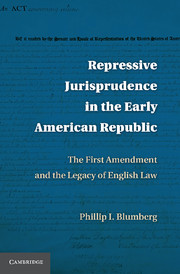 Repressive Jurisprudence in the Early American Republic
Repressive Jurisprudence in the Early American Republic Book contents
- Frontmatter
- Contents
- Acknowledgments
- 1 Political and Jurisprudential Worlds in Conflict in the New Republic
- 2 Politics in the New Republic
- 3 Criminal Libel in the Colonies, the States, and the Early Republic During the Washington Administration
- 4 Federalist Partisan Use of Criminal and Seditious Libel – Statutory and Common Law – During the Tumultuous Adams Administration
- 5 Criminal Libel During the Jefferson and Madison Administrations, 1800–1816
- 6 Partisan Prosecutions for Criminal Libel in the State Courts: Federalists Against Republicans, Republicans Against Federalists, and Republicans Against Dissident Republicans in Struggles for Party Control
- 7 Established Jurisprudential Doctrines (Other than Criminal Libel) Available in the New Republic for Suppression of Anti-Establishment Speech
- 8 Still Other 19th-Century Doctrines for Suppression of Anti-Establishment Speech: The Law of Blasphemy and the Slave State Anti-Abolition Statutes
- 9 Conclusion
- Table of Cases
- Index
7 - Established Jurisprudential Doctrines (Other than Criminal Libel) Available in the New Republic for Suppression of Anti-Establishment Speech
Published online by Cambridge University Press: 05 October 2010
- Frontmatter
- Contents
- Acknowledgments
- 1 Political and Jurisprudential Worlds in Conflict in the New Republic
- 2 Politics in the New Republic
- 3 Criminal Libel in the Colonies, the States, and the Early Republic During the Washington Administration
- 4 Federalist Partisan Use of Criminal and Seditious Libel – Statutory and Common Law – During the Tumultuous Adams Administration
- 5 Criminal Libel During the Jefferson and Madison Administrations, 1800–1816
- 6 Partisan Prosecutions for Criminal Libel in the State Courts: Federalists Against Republicans, Republicans Against Federalists, and Republicans Against Dissident Republicans in Struggles for Party Control
- 7 Established Jurisprudential Doctrines (Other than Criminal Libel) Available in the New Republic for Suppression of Anti-Establishment Speech
- 8 Still Other 19th-Century Doctrines for Suppression of Anti-Establishment Speech: The Law of Blasphemy and the Slave State Anti-Abolition Statutes
- 9 Conclusion
- Table of Cases
- Index
Summary
Introduction
The early American experience with criminal libel represented only one of a number of established criminal common-law doctrines available in the Early American Republic for the partisan suppression of critical speech. There were a series of other repressive common-law doctrines inherited from English law widely used to protect other institutions of the established society against vigorous critics. Supplementing criminal libel reviewed in the preceding chapters, the additional repressive doctrines reviewed in this chapter include such criminal remedies for suppression of dissenting speech as contempt of court for out-of-court criticism of judicial decision or conduct, contempt of the legislature for out-of-chamber critical publications, and pre-trial binding over for good behavior (i.e., no more offending statements).
These additional repressive doctrines did not stand alone. In addition, two other areas of suppression of dissenting speech existed that did not involve the partisan suppression of opposition political speech. One was the state statutory and common law criminalizing blasphemous religious commentary. The other was the body of state law criminalizing discussion of slavery. These are reviewed in the next chapter. The slavery statutes, although arising later, are very much closer to criminal libel than the blasphemy cases. Both involve sensitive political areas in which political/moral concerns run deep, human passions run high, the potential for violent aftermath is strong, and the security of the state may be at stake.
Along with criminal libel, these supplemental doctrines illustrate the surprising extent of the legal doctrines of the times available for the suppression of what may be termed anti-establishment speech.
- Type
- Chapter
- Information
- Repressive Jurisprudence in the Early American RepublicThe First Amendment and the Legacy of English Law, pp. 243 - 317Publisher: Cambridge University PressPrint publication year: 2010


